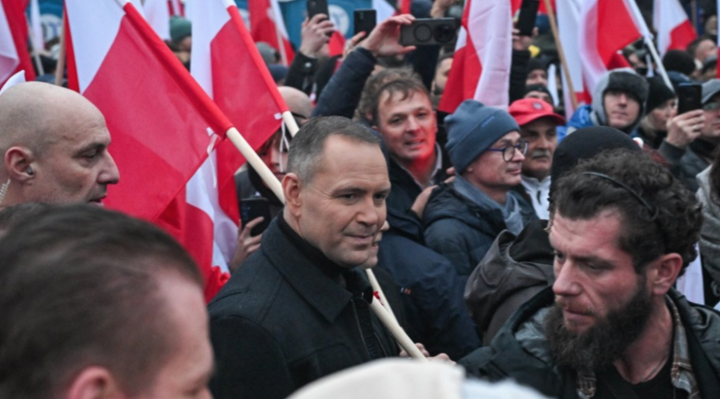Norway’s public broadcaster NRK has apologised after describing Poland’s annual Independence Day parade as a “Nazi march” during a morning TV segment, according to a statement sent to Poland’s State news agency PAP.
The phrase appeared in a caption shown with video footage during a morning political programme broadcast by NRK on November 12. It was referring to the annual Independence Day march, which attracted 160,000 participants in Warsaw on November 11.
According to PAP, the Polish Embassy in Oslo requested that NRK correct the wording and the NRK admitted it had made a mistake in the statement sent on November 14.
The broadcaster informed PAP that the description had been incorrect and should not have been included in the programme.
In his written reply he said: “The term that was used is not NRK’s assessment of what this march was. Both of our nations were under Nazi occupation. It is not difficult to understand what feelings such an expression evokes.

“The term ‘Nazi marches’ was unjustified and NRK apologises for its use.”
That reply, though, was also seen as unsatisfactory for Poles who refer to the occupation as having taken place under “German Nazis”. Many regard the use of “Nazi” alone as an attempt to decouple Germany from Nazism in order to make the term pan-national.
NRK was in November one of the broadcasters, along with the BBC, found to have edited footage from a speech by US President Donald Trump during the run-up to the storming of the Capitol on January 6, 2021, that made it seem he had called for the ensuing riot.
Another apology afforded the Poles in recent days came yesterday over an auction of hundreds of items relating to the Holocaust and the German occupation.
The Felzmann auction house in the German city of Neuss was scheduled today to hold an auction of items linked to the Holocaust. They included stars of David worn by Jewish concentration camp and prisoners, documents relating to forced sterilisations, records of companies forcibly sold to the Germans and Nazi propaganda material.
The auction was cancelled following an intervention by Polish foreign minister Radosław Sikorski yesterday. His German counterpart Johann Wadephul quickly apologised for what was perceived across the board as an unacceptable attempt to monetise the tragedy of the Holocaust.
The Polish Independence March is an annual rally held every November 11 on Poland’s Independence Day, commemorating the country’s freedom following the end of the First World War in 1918. In recent years it has drawn crowds of well over 100,000.
The event has in the past drawn criticism for the fact that it is organised by nationalists, rather than being a cross-party event. It has also attracted criticism following the display of banners alleged to be xenophobic and racist.
In 2017, Liberal Belgian MEP Guy Verhofstadt caused uproar when he referred to participants in the march as “fascists, neo-Nazis and white supremacists” during a European Parliament debate.
His remarks led to a Polish lawsuit against him for defamation but the EP decided not to waive his immunity, ruling the statements were made as part of his duties as an MEP.
This year, the march passed off without incident and included participation of Poland’s opposition Conservatives (PiS) ally President Karol Nawrocki.
